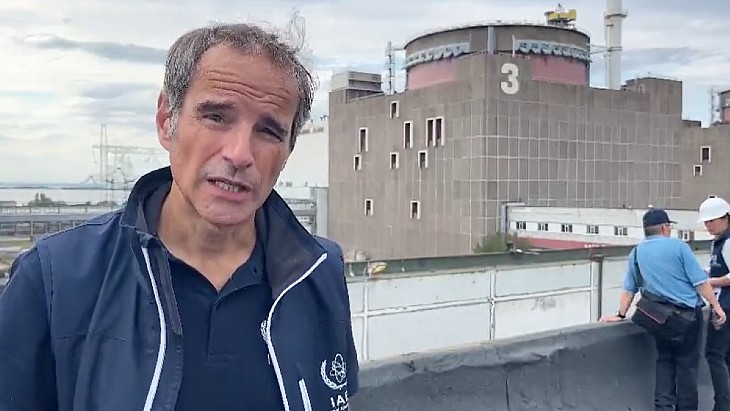Speaking after his visit to the plant, Grossi told reporters "it is obvious that the physical integrity" of the plant had been "violated several times - by chance, or deliberately, we don’t have the elements to assess that" but "this is the reality that we have to recognise and this is something that cannot continue to happen".
He said that wherever you stand or "whatever you think about this war, this is something that cannot happen". Grossi said that during his visit, which lasted a few hours, he "saw a lot… I was able to tour the whole site, I went into the units, I could visit the emergency systems, the diesel generators, the control rooms … so we chose three or four key areas I needed to see first-hand. Of course I was able to talk to the staff as well".
He said he assured the staff that the IAEA was "not going anywhere" with some of its experts remaining at the nuclear power plant. He added that there was a lot of work now to be done in terms of "detailed analysis of some of the more technical aspects of what we saw".
The six unit plant, Europe’s largest, has been occupied by Russian military forces since early March, although it continues to be operated by its Ukrainian staff.
It is located near the frontline between Ukrainian and Russian forces and has been shelled a number of times during the past few months, raising safety concerns.
The IAEA director general spent months trying to organise a visit to the plant by inspectors. The hope is that their presence will stabilise the situation and they will be able to conduct vital safety checks at the site - on the equipment - as well as checking on the welfare of the staff and ensuring that they are able to operate it in a safe manner. They are also expected to be looking to check on the safety and security of all nuclear materials at the site.
Grossi and his IAEA team finally made it to the nuclear power plant on Thursday afternoon, taking the decision to go ahead with the last stage of the mission, despite fresh military exchanges in the area which both sides blamed on the other.








_94566.jpeg)






